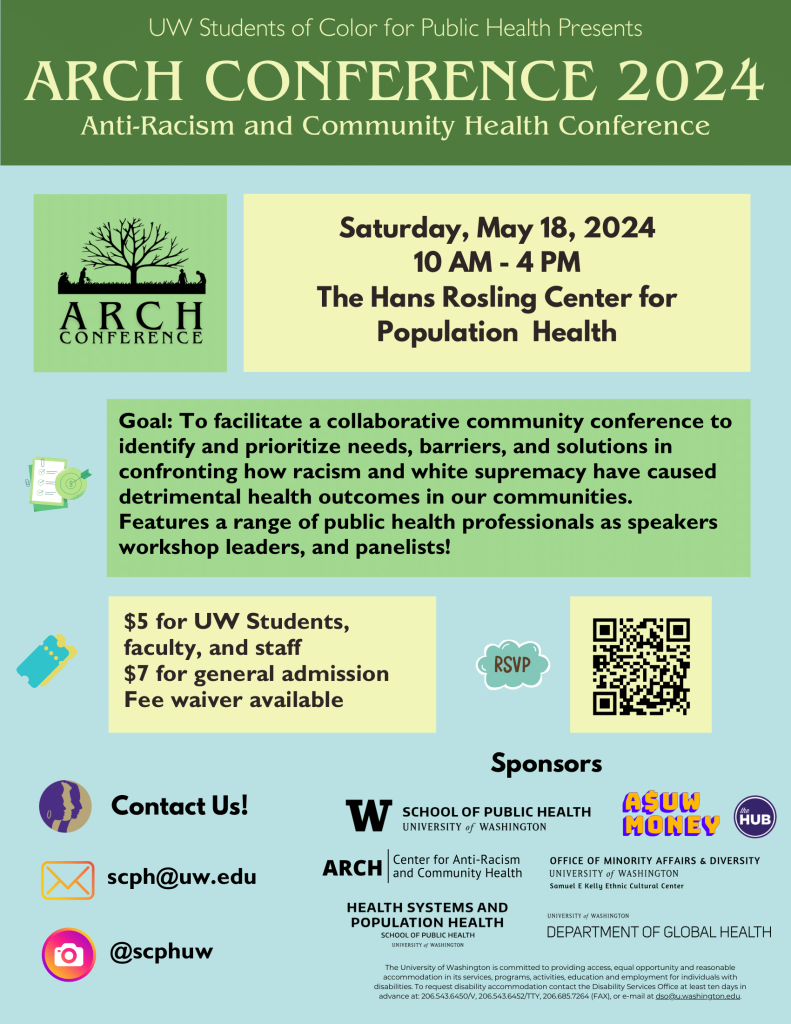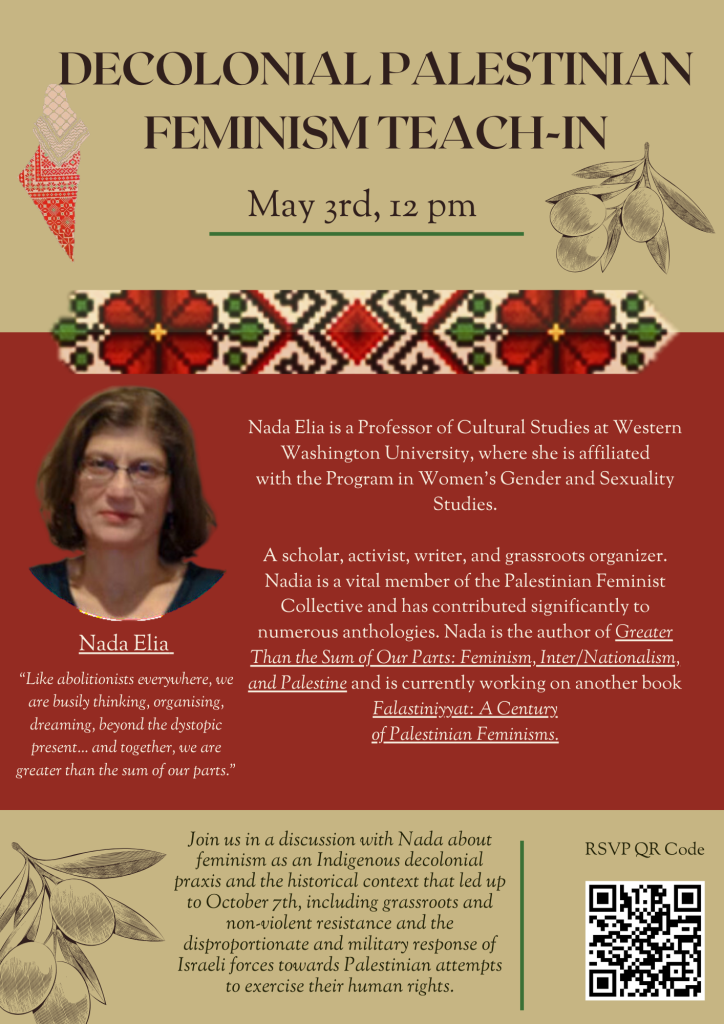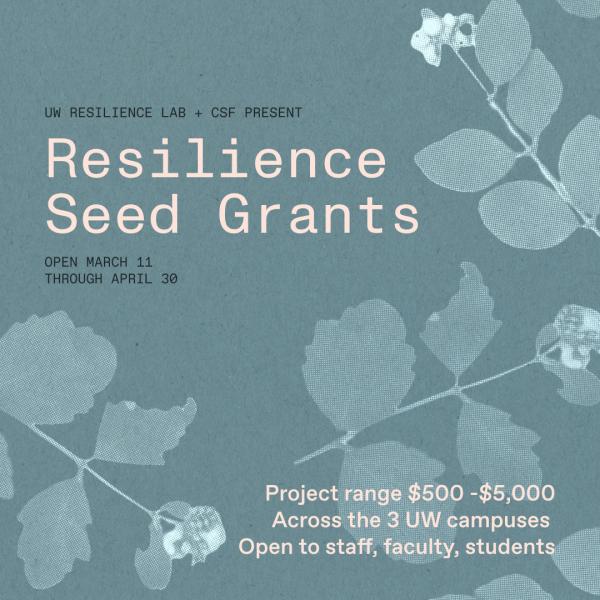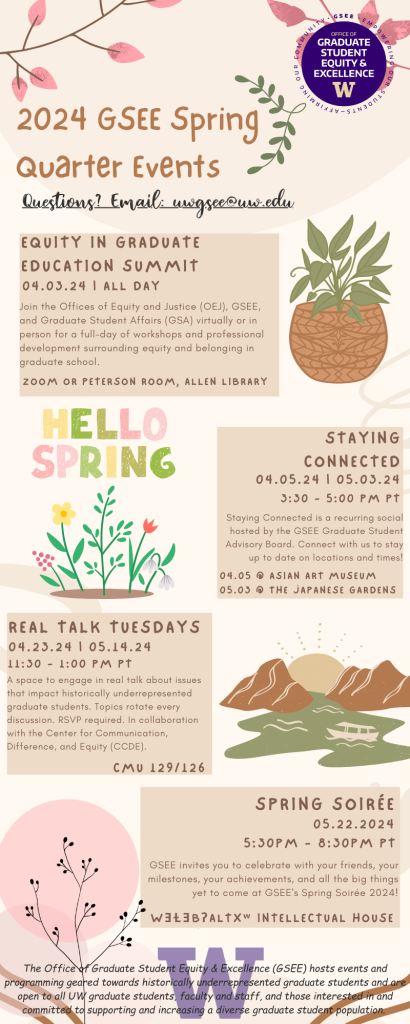
Posted under Information Sessions, Seminars, lectures and films, Social Justice, Workshops on May 3, 2024
The Anti-Racism and Community Health (ARCH) Conference is a day-long program conference on Saturday, May 18th from 10AM-4PM in the Hans Rosling Center for Population Health. ARCH works to facilitate a collaborative environment to identify and prioritize needs, barriers, and solutions in confronting how racism and white supremacy have caused detrimental health outcomes in our communities.
The conference will feature a range of public health professionals as speakers, workshop leaders, and panelists. As a collective, speakers and attendees will critically examine their own identities and lived experiences to question how our health has been impacted by racism. The cost of attendance for this year’s conference is $5 for UW Community members, and fee waivers are available. Food, drink, dessert & coffee are included in the ticket. You are welcome to check-in at any time before 3pm the day of the conference. More information is available on our Instagram, @scphuw! We hope to see you there!

Posted under Seminars, lectures and films, Social Justice, Workshops on Apr 30, 2024
Join the School of Social Work community for a teach-in by Dr. Nada Elia, PhD, titled “Feminism as an Indigenous Decolonial Praxis.” Dr. Elia will lecture on the historical context that led up to October 7th, including grassroots and non-violent resistance and the disproportionate and military response of Israelis towards Palestinian attempts to exercise their human rights. All students, faculty, and staff of the School of Social Work are warmly invited.
About the facilitator:
Dr. Nada Elia is a Professor of Cultural Studies at Western Washington University, a scholar, writer, and grassroots organizer. Dr. Elia is a vital member of the Palestinian Feminist Collective.
RSVP Here: Community Teach-In Invitation and RSVP
Date & Time: Friday May 3rd at 12pm

Posted under Health, Social Justice on Apr 12, 2024
On April 24th, the US Supreme Court will hear oral arguments in Idaho vs. United States, a lawsuit which centers on whether Idaho’s near total abortion ban conflicts with the requirement for all providers to administer emergency care under the Emergency Medical Treatment and Labor Act (EMTLA).
Ahead of the Idaho vs. United States oral arguments, The Pacific Abortion Project, the Center for American Progress, Planned Parenthood and Doctors for America are partnering to host a reproductive health advocacy training on Thursday, April 18th at 6pm PST. Learn how to use your platform as a healthcare professional to advance advocacy issues that are important to you and your patients! Please sign up here if you’d like to attend. Those who sign up will receive a zoom link the day of the event via email.
Read more: Health Advocacy Training 4/18Many of the WWAMI states have restricted or essentially eliminated access to abortion since the Dobbs vs Jackson Women’s Health decision in 2022. These conditions make it difficult, if not impossible, for many patients living in our region to access essential reproductive health care. As future providers, we have an incredibly powerful platform to advocate for and against legislation that affects our patients, though it can be difficult to know how to participate in the legislative process when we receive little formal advocacy training.
In the meantime, check out the Center for American Progress’ Storyteller Initiative, which showcases the voices of health professionals in Idaho regarding Idaho’s abortion ban, including two of our WWAMI Idaho students!
The Pacific Abortion Project Leadership Team
What is the Pacific Abortion Project?
We are a WWAMI-wide coalition of students across all years and foundations sites who are committed to improving abortion access and expanding abortion education for medical students.
We started our project by building a website that students rotating in WWAMI can use to learn about abortion care and access across the region. Since then, we’ve worked on various abortion-related projects and hosted virtual and in person events to learn more about the landscape of abortion care, medication abortion by mail, etc. and to raise money for our local abortion fund, NWAAF.
Posted under Money Matters, Research, Social Justice, Student Opportunities - research, Student Resources on Apr 12, 2024
The UW Resilience Lab and the Campus Sustainability Fund (CSF) are pleased to share the 2024 Resilience and Compassion Seed Grant cycle is accepting applications! The application form will remain open until Tuesday, April 30, 2024.
Read more: 2024 Resilience and Compassion Seed GrantThese small grants (<$5,000) support efforts to promote resilience, compassion and sustainability and foster connection and community at the UW. Seed grants support impactful activities, programming, projects and/or applied research that align with the following goals of the Resilience Lab and the CSF:
All members of the UW community are eligible to apply – including students, staff and faculty across the three campuses; however, preference will be given to teams that include students.
Past funded project have included: workshops, retreats, community activities, social justice and anti-racist training, building connections between the Seattle community and UW, and applied research.
To apply, submit the following information and materials through the 2024 Resilience and Compassion Seed Grant application (Google form).
The short application includes a request for:
Funding guidelines are listed on the 2024 Resilience and Compassion Seed Grant application. To learn more, check out former Resilience Seed Grant recipients, here.
Applications are due Tuesday, April 30 by 11:59 pm. Contact Rudy Gallardo, the Resilience Lab Coordinator (rodrig5@uw.edu) or Tatiana Brown, the CSF Associate Program Director (csfcoord@uw.edu) for any questions regarding the Seed Grant applications.

Posted under Events, Health, Interest areas, Social Justice on Apr 11, 2024

Join the UW School of Social Work community for a healing circle focused on the ongoing injustice taking place in Palestine, facilitated by Haneen Ahmad, MSW, LICSW. All students, faculty, and staff of the School of Social Work are warmly invited.
RSVP Here: https://forms.office.com/pages/responsepage.aspx?id=W9229i_wGkSZoBYqxQYL0k_FU8XLLbtProfwA_By87ZUQzlXUjBGWUcwREk2V1A3VTRQSThMVjZCNS4u
Together, we’ll create a space for collective processing of emotions, affirming the validity of our feelings amidst this crisis. Through mutual support, dialogue, and creative arts we’ll honor the right to our emotions and work towards healing in solidarity.
About the facilitator:
Haneen Ahmed, LICSW is the founder of Zane Counseling and an alum of the UW School of Social Work.
Date & Time: Thursday, April 18th from 4:30-6pm
Location: UW School of Social Work 305A
Posted under Events, Global Health, Health, Interest areas, Seminars, lectures and films, Social Justice, Workshops on Apr 5, 2024
Registration is now open for the Northwest Nature and Health Symposium on May 1 at the Intellectual House! This year’s event features eight talks, one moderated discussion, a student poster session, and the chance to connect with interdisciplinary colleagues who are interested in conservation and health equity. Registration closes on April 27 and student scholarships are available.
Nature and Health illuminates the connections between nature and human health and well-being. We work with the community and decision makers to translate our findings into programs and policies that promote equitable engagement with nature.
Our symposia are:
Logistics:
Posted under Just for fun, Seminars, lectures and films, Social Justice, Student Resources, Student support and self care on Mar 27, 2024
Please see the attached GSEE Spring Quarter Events Flyer to share with graduate students impacted by racism and its intersections. For full details regarding our events, stay tuned to our social media channels (@uwgsee). Students can receive GSEE weekly graduate student newsletters by signing up via this link.
Save the date for GSEE’s Spring Soirée on Wednesday, May 22 at the wǝɫǝbʔaltxʷ – Intellectual House on UW Seattle’s campus. Spring Soirée is an annual signature event that celebrates continuing and graduating GSEE students with a reception and informal cording ceremony. Graduate students from all three campuses are welcome to attend. More details will be forthcoming.

Posted under Information Sessions, Interest areas, Social Justice, Workshops on Mar 13, 2024
Join Forefront Suicide Prevention for this free one-hour virtual event where we hear from Paige Gaines of 911 Sane Jane. A powerful storyteller and advocate, Paige will share her own mental health challenges, her experience with suicide, and her journey to educate on the uniqueness of these challenges within black communities.
This event, and the entire Suicide Prevention &… series, is presented in partnership with the Washington State Department of Health. Please find the date and speaker bio below.
Date: March 28th, 2024
Time: 12p-1p
Speaker Bio:
At just 33, Paige Gaines has already made a name for herself nationwide as a sought-after speaker and prominent mental health activist. In 2021, she received NAMI Georgia’s Young Leader Award for her work as a mental health advocate and pioneer. Paige has been featured in several well-known publications, including People Digital, Black Enterprise, Stigma Fighters, and the Child and Adolescent Psychiatric Clinic Journal. With a bachelor’s degree in public relations, she understands the importance of community education and awareness. She’s a two-time suicide attempt survivor diagnosed with bipolar disorder at the age of 22, and a Certified Peer Specialist and Mental Health Coach – making her life’s journey full of adversity, strength, and impact. After feeling invisible and without a purpose for the first 24 years of her life, Paige is now the founder and CEO of 911 Sane Jane, an organization dedicated to providing a voice for the voiceless through education and storytelling.
Posted under Events, Global Health, Health, Information Sessions, Interest areas, International, Seminars, lectures and films, Social Justice on Feb 23, 2024
The Department of Global Health is sponsoring a webinar on The Humanitarian Crisis in Gaza and Public Health Responses on Monday, February 26 from 11:30 a.m. – 1 p.m. PST. It is open to others across the UW campus and the community.
The goal of this webinar panel will be to provide a more detailed understanding to the UW community of the public health aspects of the crisis and the role of global health professionals addressing current and anticipated health needs of the population.
Registration is required. **Once you register, you will be sent a link for the Zoom webinar.
Posted under Career information and Professional Development Opportunities, Events, Social Justice on Nov 28, 2022
One of ASUW’s collaborators, the Office of Government Relations (OGR), is hosting a Legislative Reception on the 5th of December from 5:00-7:30PM in the HUB (North Ballroom). This is an event in which students can directly engage with legislators and other governmental staff in Washington, and learn about community and legislative affairs both at a state and federal level. Additionally, a free catered dinner will be provided.
ASUW is reaching out specifically to put out an ask for student speakers interested in speaking on the topic of sexual assault and/or reproductive healthcare. The chosen individual would be expected to make a 5-10 minute long speech on their personal experience(s) with barriers to accessing survivor resources and/or reproductive healthcare.
This speech is an opportunity for powerful activism, as the chosen student will be directly speaking to legislators across Washington to highlight how important of an issue this is. Further, expanding sexual health and reproductive rights are a high priority in our legislative agenda this year – meaning they will be advocated for by a student employee in Olympia this winter, directly to our state government. Both the Office of Government Relations (OGR) and the Sexual Assault and Relationship Violence Activists (SARVA) are more than willing to work with the student to help them write a speech they are confident in and comfortable with!
If students are interested in speaking at this event, please feel free to reach out to me at asuwadsa@uw.edu or OGR at asuwogr@uw.edu.
Posted under Social Justice on Nov 8, 2022
Dearest UW SSW Students, Staff & Faculty,
The M.L.K. Commemoration Committee is thrilled to share that nominations are now open! We seek your nomination for the 2023 Martin Luther King, Jr. Community Volunteer Recognition Award. Our question: Whom do you know that should be noted for how their work continues the legacy of Dr. King at UW SSW? Won’t you take a moment to nominate that person, program or group?
Posted under Events, Interest areas, Social Justice, Student Groups on Campus, Student Resources on Nov 8, 2021
The Incarcerated Mothers Advocacy Project (IMAP) is a coalition of law students, attorneys, social service providers, and formerly incarcerated people who seek to change the rights afforded incarcerated and previously incarcerated people in Washington. Centering reproductive justice, IMAP supports incarcerated people by providing legal information on family law and dependency issues, and by connecting parents to outside resources. IMAP offers monthly legal classes and office hours at Washington Corrections Center for Women to share resources with incarcerated people and their families. IMAP also works to connect community providers, such as parent, chemical dependency, and domestic violence advocates and experts to incarcerated women by hosting a series of classes and trainings at our prison sites.
IMAP will be holding a virtual orientation November 13th-14th covering topics of Family Law and Dependency Law on Saturday; Reproductive Justice and Prison Abolition on Sunday. Registration is open at this link: bit.ly/uwimap2021
If there are any questions, email delaroch@uw.edu or ccike@uw.edu
Posted under Social Justice on Oct 4, 2021
Sent on behalf of River Cornelius
—
Orange Shirt Day is a time to recognize and remember the history and legacies of the residential school systems in the United States and Canada. In 1973, on Phyllis Webstad’s (Stswecem’c Xgat’tem First Nation) first day at St. Joseph’s Residential School, her shiny new orange shirt was stripped from her. Indian Residential Schools existed to assimilate Native American children and youth into Euro-American culture, often involving physical, sexual, emotional, and psychological abuse. The system forcibly separated children from their families and forbade them to acknowledge their Indigenous culture. During this time, children’s hair was shaved, their language went unspoken, families were broken apart, and trauma was inflicted onto Native communities.
On Orange Shirt Day 2021, Medicine Wheel Society is helping to raise money for Native youth at Labateyah Youth Home in Seattle, WA to honor our ancestors and care for future generations. Please consider making a contribution if you are able at this link (write “Labateyah” in the comments to ensure your contribution is directed to the youth home): https://www.unitedindians.org/donate-now/. You can learn more about Labateyah and United Indians of all tribes here: https://www.unitedindians.org/services/youth-home/.
Medicine Wheel Society is honored to share this design by River Cornelius (Oneida – Iroquois/Haudenosaunee). Skeletons are featured in the design to pay respect to the hundreds of Native children whose bones were discovered in unmarked graves at former residential school sites earlier this year. The artist uses night sky blankets in reference to a story they know of Indigenous children who were abused and, in order to escape the abuse, danced away and became stars in the night sky. The blankets are trimmed with the Skydome design that separates Turtle Island from the Skyworld, where all our ancestors are and from where Sky Woman fell. The skeletal ancestors care for their descendants by braiding their long hair and by passing on stories and songs to the parent, who then shares these traditions with their child. This is to show the resilience of Indigenous people and how continuing oral traditions allows ancestors to continue to exist. This represents caring for future generations and current living Indigenous children, to ensure our children are well taken care of and given the love and nurturing they need to grow strong, healthy, and happy – like the blooming sunflowers with one yet to bloom. Throughout all of this, Grandmother Moon continues to watch over all generations of her grandchildren through the passage of time with unconditional love.
MWS Facebook link here: https://facebook.com/MWSUW/posts/2914617105466003
Posted under Events, Social Justice on May 3, 2021
Date: Tuesday, May 4, 2021
Time: 12:00 noon to 1:30 pm
Zoom ID: https://washington.zoom.us/J/93376772547
No password needed. Anyone can join using the Zoom ID.
The Faculty Council on Multicultural Affairs invites faculty, students, staff, alumni, neighbors, and other members of the community to join a webinar on racism against Asian Americans and Pacific Islanders. Four illustrious panelists will speak on the past, present, and a brighter future. Please see the attached flyer.
Panelists:
Naomi Ishisaka, Assistant Managing Editor, Seattle Times
Hye-Kyung Kang, Chair, Social Work, Seattle University
Jane Lee, Assistant Professor, Social Work, UW
Linh Nguyen, Assistant Professor, American Ethnic Studies, UW
Moderators: Yoriko Kuzuki, Michael Spencer, Gautham Reddy
Posted under Social Justice on Mar 11, 2021
Please see the SSW Leadership statement condemning the recent dramatic rise in anti-Asian racist incidents, recently posted on the School’s website:
The School will also be publishing a piece on the great work that David Takeuchi and colleagues are doing to document and follow up on these hateful incidents and call for reform. Please stay tuned for that piece.
Posted under Events, Seminars, lectures and films, Social Justice on Jan 7, 2021
RSVP for link: HTTPS://FORMS.GLE/UZOHWEBK6BAVK2MHR
Posted under Social Justice, Student Groups on Campus on Jan 7, 2021
The FIUTS Discussion Series on Race & Racism in the U.S. is starting up again next week and registration is now open! This is a space for international and U.S. students, as well as others in the UW community, to learn from and with each other to make sense of current events and experiences in the U.S. The winter quarter series will run on Wednesday evenings from 4:30-6:00pm Seattle time January 13th through February 10th. In order to create a safe learning space, participants are expected to be able to attend the entire 5-part series. Registration is open on the FIUTS website at www.fiuts.org/talk-about-race.
Posted under LGBTQIA+, Social Justice, Student Groups on Campus on Dec 6, 2020
World AIDS Day is a time for our community to come together to remember all those we have lost to AIDS and to recommit to ending the stigma that still surrounds HIV. LGBTQ people in the United States and around the world continue to be disproportionately affected by HIV and AIDS, especially Black and Latinx members of the community. To end the HIV epidemic, we must uplift the voices of those who have been affected and take action to fight stigma in all aspects of our lives. While HIV and AIDS is not an illness that solely affects LGBTQ+ people, a portion of queer history is marked with the negligence and intolerance of leadership during the AIDS Epidemic.
According to the U.S. Centers for Disease Control and Prevention (CDC), there are 1.2 million people living with HIV in the United States. Gay and bisexual men made up an estimated 2% of the U.S. population in 2013 but 55% of all people living with HIV in the United States. If this continues, 1 in 6 gay and bisexual men will be diagnosed with HIV in their lifetime. For Latino and Black men who have sex with men, the rates are in 1 in 4 and 1 in 2, respectively.
Transgender people have also been hit especially hard by the epidemic despite comprising a similarly small percentage of the U.S. population. One international analysis found that transgender women in certain communities have 49 times the odds of living with HIV than the general population.
Dealing with the potential consequences of bias and discrimination – job loss, homelessness, lack of healthcare insurance – often results in LGBTQ people engaging in behaviors that facilitate the spread of HIV. For example, in the face of persistent employment discrimination, many transgender women are left with few other options but to engage in survival sex work in order to meet their most basic needs. According to a 2015 survey of more than 27,000 transgender people, “The rate of HIV [diagnosis] was…five times higher among those who have participated in sex work at any point in their lifetime” than among those who have not
“HIV and the LGBTQ Community.” HRC, www.hrc.org/resources/hrc-issue-brief-hiv-aids-and-the-lgbt-community.
Moving forward we can all do better to support the eradication of HIV/AIDS as well as supporting those afflicted. For Example:
· Urge Congress and the White House officials to mount the strongest possible response to the epidemic in the form of fully funded public health programs, as well as common sense policy solutions such as comprehensive sex education and syringe/needle exchange.
· Support and fund educational programs for LGBTQ people and allies about the current realities of HIV as well as the effects of stigma on the very communities that are most in need.
· Mobilize alongside LGBTQ people to take action in support of ending the dual epidemics of HIV and HIV-related stigma.
· Advocate for the dignity, rights, and well-being of people living with and affected by HIV in all aspects of life and at every level of society.
The CDC has put together a multitude of resources that include toolkits on preparing messaging, creating promotional material, sharing resources, and continuing the momentum.
Link: https://www.cdc.gov/worldaidsday/index.html
Posted under Events, Seminars, lectures and films, Social Justice on Nov 22, 2020
EARTHLAB SALON Series: How We Present Native Knowledge is Environmental Justice: A case for Indigenous storytelling in museums
TUESDAY, DECEMBER 1 | 6:00-7:00 p.m. | Online | RSVP: https://bit.ly/35gHWJF
Part of centering equity and justice in environmental work includes honoring the knowledge and work of communities that disproportionately face environmental harms. This idea comes to bear when we consider the social and ecological harm Indigenous communities are experiencing due to large environmental events such as climate change, yet much of the academic and institutional community dismiss Native knowledge as non-scientific and non-relevant.
As public institutions, museums are often the primary, self-proclaimed expert of knowledge. They present Indigenous cultures and discuss their relationship to lands while suppressing the voices of the disenfranchised. The presentation will be focused on presenting some of the treasures of the Burke Museum along with commentary by Indigenous activists and poets, who will reclaim their history and stories creating a larger shift in how we present Indigenous Knowledges in Western institutions.
For more information on the speakers and to learn more about the EarthLab Environmental Justice Salon Series, go to: https://earthlab.uw.edu/news-and-events/salons/
EarthLab Salon Series December 1.2020
Posted under Social Justice, Uncategorized on Nov 16, 2020
In the aftermath of an amazing election; amidst the joys and challenges of your studies—yes, even as a pandemic rages—may we each take a moment to return towards commemorating the life and legacy of Dr. Rev. Martin Luther King Jr. We are now seeking nominations for the 2021 Martin Luther King, Jr. Community Volunteer Recognition Award at our UW School of Social Work. Our question to you: Whom among us should be noted for how their work continues the legacy of Dr. King? Won’t you take a moment to nominate that person, program or group?
With our Health Sciences Center colleagues, we will recognize awardees at this two-part, remote commemoration that honors individuals or groups who exemplify this national holiday’s principles through their:
Commitment to addressing community needs, particularly communities of color and those who are marginalized
Development and implementation of significant programs to improve the human condition
Outstanding efforts to protect and empower all people.
Please nominate a UW school of social work student, staff, faculty member or group!
-Describe the good work that person or group has done;
-The ways it matches the above criteria of the award;
Please submit your brief letter of support for your nomination(s) to our MLK Commemoration Committee, attention: Khalfani Mwamba, mwambk@uw.edu, no later than Friday, December 11th at 0500p.m.
We so appreciate your help in identifying these deserving persons and groups! Don’t delay, nominate today!